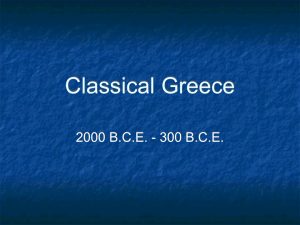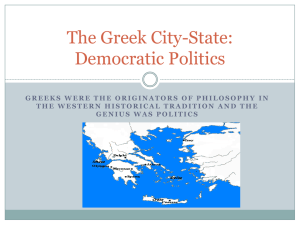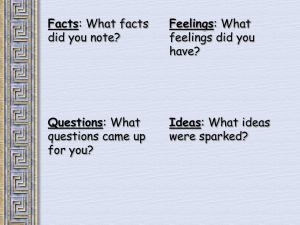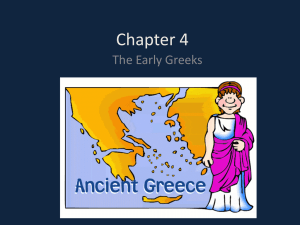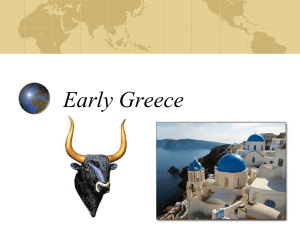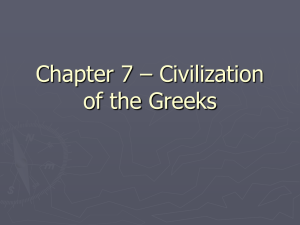Greece - New Caney ISD
advertisement
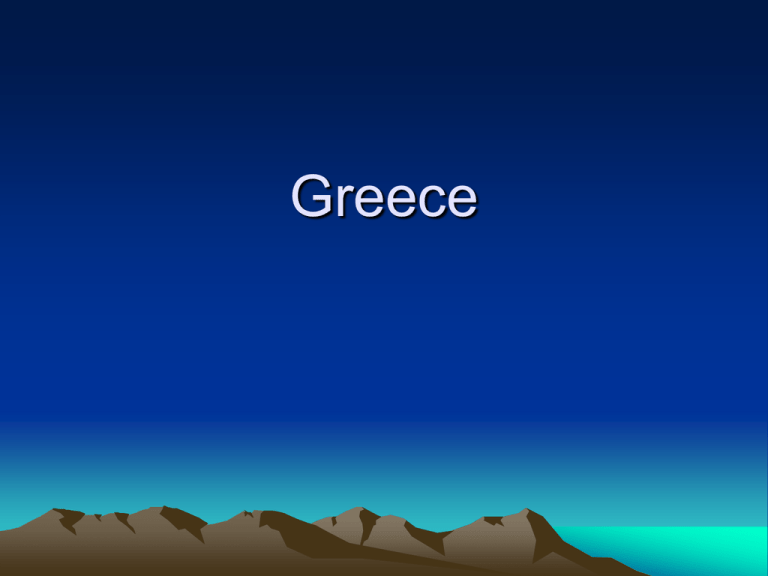
Greece Geography • Mountainous area • Consists of 1400 islands • Poor in natural resources • 20% of land good for farming • Very hard to communicate or transport anything A. GEOGRAPHY SHAPES GREEK LIFE The Aegean Sea Minoans • Lived in Crete • Capital City is Knossos • Named after King Minos Minoan Art Mycenaean • Indo-Europeans who settled in Greece Mycenaean • Very militaristic society • Conquered what was left of the Minoan society (borrower empire) • Writing and sea trading • Best known for the Trojan War which the Greeks won • Caused a decline in society B. Mycenaean Civilization Develops 2. Trojan War a. Legend says Helen, wife of Greek king, was captured by a youth from Troy. King sent 1,000 ships to rescue her and they used the Trojan Horse. b. Findings suggest there might have been a war but was it over Helen? The face that launched c. Mycenaeans become dominate a thousand ships power in the Aegean area Dorians • Iron-using invaders that destroyed the Mycenaean society • Not as advanced as Mycenae, so Greece went into a period of decline = dark age Dorians • Lack of writing=oral tradition • Bards spoke the history and glory of the rulers in Greece • Homer was the most famous bard – Wrote Illiad and the Odyssey – These are epics which are narrative poems celebrating heroic deeds – The epic’s purpose is to show Greek ideals of virtue and excellence Greeks • City-states or polis were created • In a polis, there was a fortified hilltop called an acropolis Greek Government • Some Polis were governed by a monarchy where kings and queens rule Greek Government • Some polis were governed by aristocracy where a small group of land-owner families Greek Government • Some polis were governed by oligarchy where a few powerful people rule • Rule is based on wealth Greek Government • Tyrants took over • They are powerful individuals who control the government with the help of the poor Greek military • Hoplites, foot soldiers, was the main force in any Greek army • They formed the fearsome formation called the phalanx Sparta • Daily Life • Boys left home at 7 and started military training (he would not stop being in the military until the age of 60) • Women also trained in sports and managing family estates Sparta • Individual expression is discouraged • Service to Sparta is above everything • Spartan values duty, discipline, and strength Athens • Located in eastern Greece • Created democracy, or rule by the people • Citizens participated directly in political decision making (Citizen is a free adult male) • Women were seen, but not heard Greece • Persian Wars- War between Persia and Greece Greece • Persia under Darius attacked Greece at Marathon, but lost (start of a Marathon-26 miles and 385 yards) Greece • Darius’ son Xerxes led another invasion of Greece. • Xerxes won at Thermopylae, but was held there for 3 days by 300 Spartans • He lost at Salamis at sea and then lost at Plataea on land Athens • After Persian War, Athens grew in power under Pericles Athens • To increase the power of Athens, Pericles built a 200-ship navy (largest in the Mediterranean Sea) • To glorify Athens, Pericles supported the building of the Parthenon Greek Art • Greek sculptors designed sculptures that were natural and lifelike. • That became classical art Greek Drama • Greeks were also known for their plays • Tragedy-serious drama with love, hate, war, and betrayal – Examples : Oedipus by Sophocles and Medea by Euripides • Comedy-slap-stick situations and crude humor – Examples: Lysistrata by Aristophanes Peloponnesian War • Sparta became more hostile after Athens became powerful • The Peloponnesian War started • Sparta had advantage on land and Athens had advantage on water Peloponnesian War • Sparta surrounded Athens • After nine years of siege Athens surrendered Greek Philosophers • Philosophers are lovers of wisdom • They follow 2 assumptions – Universe is orderly and has unchanging laws – People can understand these laws through logic and reason Greek Philosophers • One group of philosophers were the Sophists • They believed truth is different for every individual Protagoras Greek Philosophers • Socrates- taught students to seek absolute truth through questioning Greek Philosophers • Plato- student of Socrates, wrote the Republic which stated that in an ideal society a philosopher king would rule Greek Philosophers • Aristotle- Plato’s student, he applied logic to all fields of life. He was also the teacher of a young boy named Alexander




